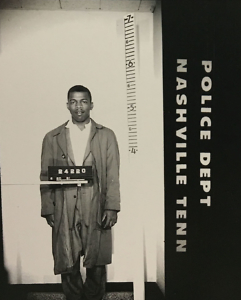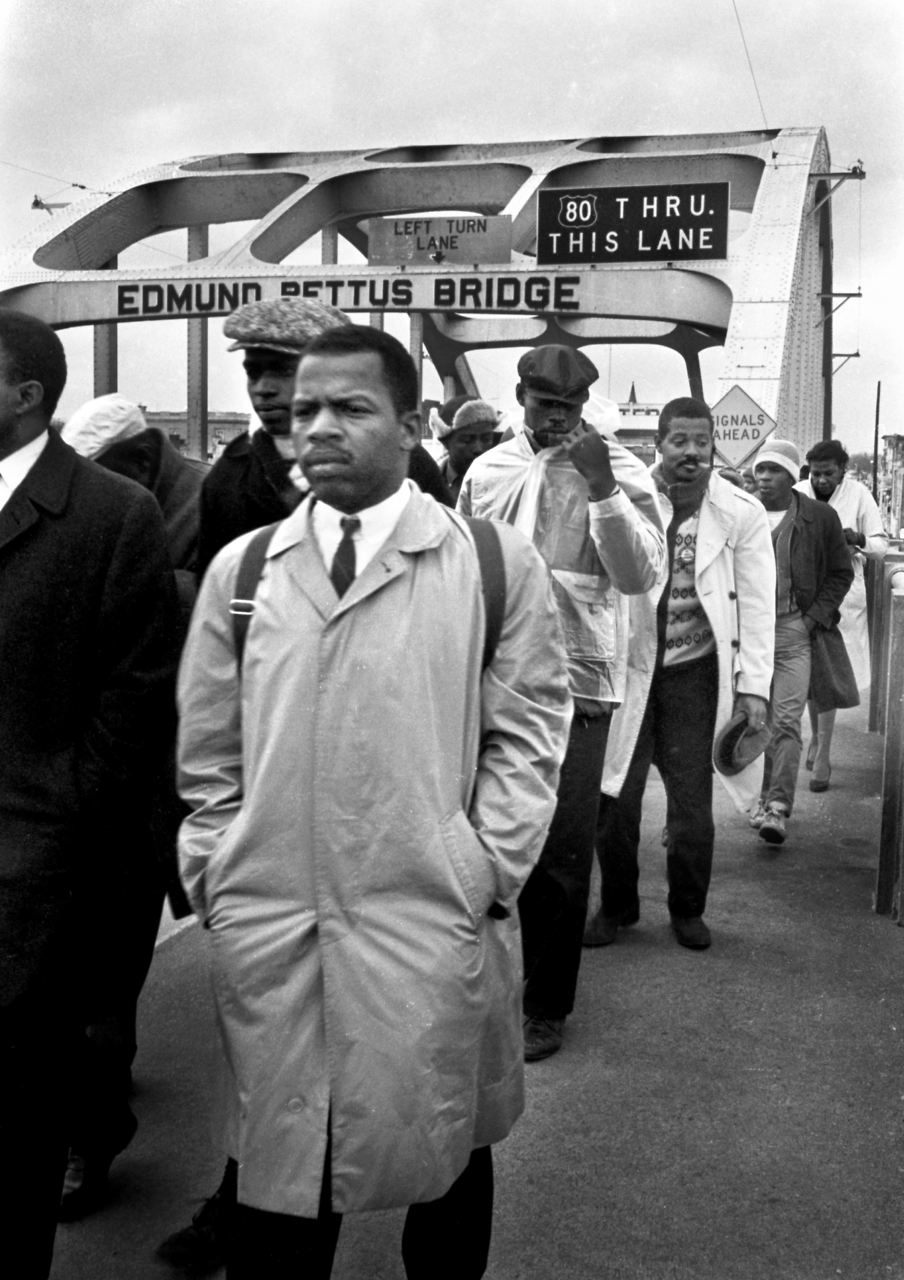A Remarkable Life
Robert K. Massie’s biography shows the human side of Catherine the Great, Russia’s brilliant eighteenth-century monarch
In 1744, when she was fourteen years old, a minor German princess named Sophia Augusta Fredericka was summoned to Moscow by Elizabeth, the childless daughter of Peter the Great, who needed a wife for her nephew and heir. Sophia (whose name was changed to Catherine when she converted to Orthodoxy), was hand-picked as a kind of brood-mare, but the arranged marriage was a disaster, and the requisite baby failed to appear.
An astonishingly quick-witted and practical girl, Catherine managed, over the course of her long and fascinating life, to spin these inauspicious beginnings into pure gold. When her new husband, Peter III, preferred to play in bed with toy soldiers than to consummate their marriage, Catherine endured not only the behavior but also the subsequent blame when she failed to produce an heir. She charmed, humored, flattered, and cajoled her way into Elizabeth’s good graces even as she endeared herself to the Russian people by learning their language and adopting their faith. She stoically endured her own mother’s indifference; she managed to manipulate the oppressively hierarchical, gossipy, back-stabbing minions who thronged the Russian court; and she ultimately gave birth to a son, Paul, who may or may not have been Peter’s child, although Elizabeth accepted him as the heir. Finally, after Elizabeth’s death, she triumphed by seizing power in a bloodless coup. (Peter, who was probably strangled by her supporters without her knowledge, was the only casualty). At thirty-three, she was crowned Empress.
 In his new biography, Catherine the Great, Portrait of a Woman, Robert K. Massie (author of the bestselling Nicholas and Alexandra and the Pulitzer Prize-winning Peter the Great) follows the monarch’s splendid trajectory from powerless teenage girl to brilliant ruler. Massie, a former Nashville resident, recently spoke by phone with Chapter 16 about Catherine’s fascinating life—and even more fascinating character.
In his new biography, Catherine the Great, Portrait of a Woman, Robert K. Massie (author of the bestselling Nicholas and Alexandra and the Pulitzer Prize-winning Peter the Great) follows the monarch’s splendid trajectory from powerless teenage girl to brilliant ruler. Massie, a former Nashville resident, recently spoke by phone with Chapter 16 about Catherine’s fascinating life—and even more fascinating character.
Chapter 16: When you write about a figure like Catherine the Great, who’s not exactly obscure, how do you manage to accommodate readers who may know nothing about your subject, yet also stake a claim to original territory? How does a biographer carve out his own niche?
Massie: You’re absolutely right: the story of Catherine has been written and rewritten. She died in 1796, and since then there’s probably been a biography of some kind every ten or fifteen years. And they’re of course varied—depending on the era, the style that’s popular or prevalent then—but they’re all dealing with the same subject. To be honest, I was not eager to do this book. It was my publisher and my editor’s idea, and they were following a well-worn path, not only as far as the writer is concerned but as far as the public is concerned. You know, it’s not a bad thing to sell books.
Chapter 16: Of course not, and, thanks to you, Catherine is now on The New York Times bestseller list.
Massie: Well, yes, but that’s because Catherine turned out to be much more interesting than I thought. Before I wrote the book, I didn’t know much about her. When Bob Loomis, my editor, who just retired after fifty-four years at Random House, said, “I think that you ought to consider Catherine,” I’d just finished twenty years in a totally different part of the world, writing about the British Navy and the First World War. And I said, “Oh, I don’t think so, Bob,” and he said, “Why not?” and I said, “Because she’s been done so often.” And then, because he’s a wily old guy, leading me down his darned path, he said, “I know that, of course, but which book about her would you say was the best?”
I said something like, “Well, I haven’t read that many.” I don’t think actually I’d read any, but I’d absorbed stuff from writing Peter the Great and Russian history in general. And he said, “OK, but which one was the best?” So then I said something arrogant. I said, “I don’t think that many of them are that good,” and he said, “Yes, I agree! You see!” And he put his finger on my chest and said, “So, you would say, then, that there’s room for another?” and I said, “I see what you’re saying.”
So then I went and got Catherine’s memoirs. And I hadn’t spent more than a few days with them before I knew that I had been absolutely wrong. This was an extraordinary story about an extraordinary person. Her description of her childhood was, to me, just as interesting as what she achieved on the throne. I have six children, four of whom are daughters, and this whole story of how Catherine grew up, how she became what she eventually did become, was such an extraordinary revelation of character, especially for women. Women have to go through extra effort to get to the top, even today. And it was far more true in her day. I mean, how many great queens were there?
Chapter 16: But reading about Catherine, I didn’t feel as if she spent her youth fighting the yoke of male oppression. The figures who loomed largest in her life, in her early life at any rate, were Elizabeth and, to a lesser extent, her mother.
Massie: I think that her mother was more important than you think. The rejection that this little girl suffered! Elizabeth was an influence hot and cold. Elizabeth probably initially thought, “How lucky I am to get somebody who’s bright and submissive.” But then, you remember, there was the whole business about why there wasn’t a baby. And Elizabeth blamed Catherine for that.
Chapter 16: That’s personal sexism. But there didn’t seem to be an institutional prejudice against a woman on the throne. Elizabeth herself certainly felt comfortable wielding power.
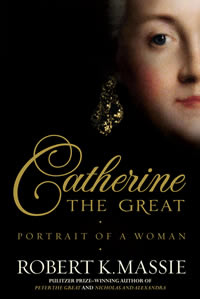 Massie: Elizabeth was the daughter of Peter the Great, and Catherine wasn’t the daughter of anyone. And Catherine wasn’t Russian. So her whole standing depended absolutely on Elizabeth. Elizabeth brought her to Russia, married her off to poor Peter, and she had an objective that was not very great for Catherine: she just wanted a baby. Except that Elizabeth over the years found out what Catherine was made of. I really love that ultimate dialogue where Catherine finally outwits Elizabeth, and says “Okay, send me home to Germany.”
Massie: Elizabeth was the daughter of Peter the Great, and Catherine wasn’t the daughter of anyone. And Catherine wasn’t Russian. So her whole standing depended absolutely on Elizabeth. Elizabeth brought her to Russia, married her off to poor Peter, and she had an objective that was not very great for Catherine: she just wanted a baby. Except that Elizabeth over the years found out what Catherine was made of. I really love that ultimate dialogue where Catherine finally outwits Elizabeth, and says “Okay, send me home to Germany.”
Chapter 16: Yes, me too, and I wanted to ask you what you thought gave Catherine the courage, or the wit, to stand up to Elizabeth at that moment.
Massie: Well, I think she decided she would win either way. She did not want to go home—that was a bluff. She was, as you know, intensely ambitious from the beginning. I think two things helped her at this point: one, she realized the strength of her position as the mother of Paul, the heir, who was five or six years old. And two: Elizabeth was failing. She was overweight, she couldn’t dance any more, she was spending hours with her toilette, and she was worried not only about dying but about the future of the dynasty. And Catherine was, by then, a growing part of that dynasty’s future—especially as it was increasingly obvious that Peter was incompetent. So I think somehow this all helped her form her game plan. But I don’t know! We don’t know just what happened.
Chapter 16: And then Catherine’s memoirs stop, right at that point.
Massie: And then her memoirs stop, yes. Which is unexplained, and almost inexplicable, though you should realize that the memoirs were never set down sequentially. They consist of a variety of different versions written for different people—all written after she was Empress, when she was supposedly trying to explain herself, or explain her life, her behavior. She was aware what people said.
Chapter 16: So they weren’t diaries written as the events occurred.
Massie: No, they weren’t. One version was written to the British Ambassador, one was written to a male friend at court, one was written to her best friend, and there were many letters to other people in Europe, like Voltaire. She wrote the memoirs and the letters both to justify and to explain. Remember she said to Diderot, “What are they saying about the death of my husband?”
Chapter 16: And he didn’t answer. What do you think happened with her husband’s death? Did she have him murdered, as many have suggested?
Massie: No one knows. What do I guess? I guess that she did not say to Orlov, Be sure that he doesn’t survive. I think she was still trying to figure it out. I think that Peter’s death was extraordinarily convenient for and very welcome to her, but I don’t think she was that duplicitous. She was still sending Peter his doctors, and she sent him his bed. I think she was trying to make up her mind what to do.
On the other hand, Peter’s jailers, Orlov and the other officers who were there—they hated him! The Seven Years’ War had been going on for six and a half years, a lot of people had been killed, and here Peter was having banquets celebrating Frederick and the Prussian Army, so they despised him anyway. And it may have been something which got out of hand, or it may have been a plot; I don’t know. Nobody knows.
Chapter 16: It may be irritating to be asked to speculate about things nobody knows—and if it is, please tell me and I’ll stop! —but I wonder: do you think that Catherine did marry her lover, Gregory Potemkin? Would marriage have changed things for Catherine—and if they were in fact married, wouldn’t Potemkin have wanted for the marriage to be known?
Massie: That’s a lot of questions! I think Potemkin lost some of his standing with Catherine by his behavior later in their relationship. Stamping his feet, slamming the door, deliberately embarrassing her, coming in to her room with nothing on but a robe open at the waist when she was talking to other people. I mean, the overriding thing for Catherine, overriding even her love and passion for this man, was that she was, by god, Empress of Russia! Nobody’s going to screw around with that. He was a very strong man. He psychologically dominated everyone else but her. She stood up to him by virtue of the fact that she had the dominant position, but I don’t know whether you’d say she had the dominant character. They were very evenly matched. But if the marriage had been known, she would have lost some of her power. And this suggests to me that she didn’t want to declare the marriage publicly.
Chapter 16: But why wouldn’t he have?
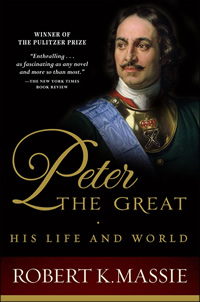 Massie: Well, what could he do? I don’t know whether she ever said, “This is just between us.” I don’t think this is in the book—I’m not sure why it isn’t—but at one point Potemkin, who was always trying to carve out new fiefdoms for himself, decided he wanted more power in Poland. And somebody said, Well, why not? And he said, “I am already far more than you realize.” I don’t know. I would suppose that Catherine was wary of that. I also agree with you that probably he would liked to have been the declared, even morganatic husband.
Massie: Well, what could he do? I don’t know whether she ever said, “This is just between us.” I don’t think this is in the book—I’m not sure why it isn’t—but at one point Potemkin, who was always trying to carve out new fiefdoms for himself, decided he wanted more power in Poland. And somebody said, Well, why not? And he said, “I am already far more than you realize.” I don’t know. I would suppose that Catherine was wary of that. I also agree with you that probably he would liked to have been the declared, even morganatic husband.
Chapter 16: During the Revolutionary War, King George III asked Catherine to send Russian troops to help the British, and Catherine declined. “The impact that twenty thousand Russians might have had on eighteenth-century America can only be imagined,” you write. What do you imagine might have happened?
Massie: I don’t know. If you think about it, though, one great power America has never fought is the Russians. Russian soldiers were not—what shall I say? —dainty. In any war. I mean look what they did to Germany in 1945. So I think it was probably a good thing. But I also like the unimaginable image of Cossacks riding through Philadelphia.
Chapter 16: In Russia in later centuries—in the novels of Tolstoy, for instance—the upper classes feign a pretentious affiliation with all things French. Did this start with Catherine? She had a great affection for and fascination with Voltaire, Diderot, and Montesquieu, and she sympathized with the Enlightenment.
Massie: It did. Catherine was taught French as a child—French was her other language, with German, when she came to Russia. What you’re talking about in the nineteenth century was really her legacy. She brought European culture to Russia, and France was the dominant cultural force in Europe in Catherine’s time. Everyone—the Germans, the British—all looked to France for art and culture. People were much more interested in what was happening in Paris than what was happening in, say, Berlin.
Chapter 16: But then she was appalled by the French Revolution.
Massie: Yes. Well, Catherine believed, as did Voltaire and Diderot, that reform should come from the top, through a benevolent despot. If you had an intelligent caring monarch, that was the way to get the best out of your people. Revolution from the bottom, like the storming of the Bastille, was not something Catherine would have approved of. And by the time they got to Robespierre and the Terror, she was horrified. And terrified.
And she connected that with everything that was happening in Poland, where the whole country was in upheaval. Whether that was a justification as well as a reason for what she did to Poland—believe me, the people I am most on my toes with when I talk about this book are the Poles in the audience. They’re not fond of Catherine. I mean, the god damned country disappeared! Anyway, I’m not trying to excuse anything; I’m just trying to explain what happened.
Chapter 16: At the end of the acknowledgements, after the usual list of family and editors and so on, you thank Catherine herself. “After eight years of having her a constant presence in my life, I shall miss her,” you write. Intense intimacy is never simple, and I wonder, having spent so many years with this remarkable woman, whether there are any aspects of her character you found you didn’t like.
Massie: I can’t find much to dislike or disapprove of in the first half of her life, before she came to the throne. She was a woman, she had these tremendous challenges, I think she dealt with them well. She was perhaps duplicitous in dealing with various characters at the Russian court, but the more important thing historically is on the throne. I admire greatly what she tried to do to reform the legal code. I admire the fact that she… I’m trying to eliminate the things I admired! I admire the fact that she called a legislative commission and was willing to listen to them up to a point. I admire the fact that she wanted to, in effect, do away with serfdom, or at least ameliorate it.
I guess you could fault her for turning Peter Panin loose on the rebellion of Pugachev. She was opposed to torture, and she tried to abolish capital punishment, but still, it was a hard thing for me to write about—bringing Pugachev to Moscow in a cage. I mean, we don’t bring people from Guantanamo up to be executed in New York in cages. I guess the thing that most people are critical of is her handling of her son Paul.
Chapter 16: She seemed almost to replicate Elizabeth, there.
Massie: Well, I think she was worse, because Paul was her son. That was the deal—she’d been brought to Russia to produce a child. And you can explain it, I guess, though not excuse it, by the fact that she had had no sustained contact with Paul. Elizabeth had snatched him away as a baby, and she had not been allowed to see him. Then there was the business of him becoming aware of his putative father, his death, and so forth. But her refusal—later, when he was an adolescent or young man—to let him have any part, or have a sense of having a part, of being the heir.
Chapter 16: I think he worried up till the moment of her death that she might disinherit him.
Massie: He did. But look: many monarchs are uneasy, thinking about the crown prince. It goes all the way back to Henry the IV, remember? And then you have Queen Victoria, who wouldn’t give Edward VII the time of day. Elizabeth II doesn’t let Charles do anything. Even presidents aren’t immune—Harry Truman didn’t know we had the atomic bomb until Roosevelt was dead. Nixon, after he made Ford vice president, said to one of his henchmen, “Can you imagine Jerry Ford sitting in that chair?” I think anyone faced with an heir wants to diminish, if not do away with, the thought that he himself won’t always be there.
Chapter 16: So your heir is more than just a threat to your power; he or she is a reminder of your mortality.
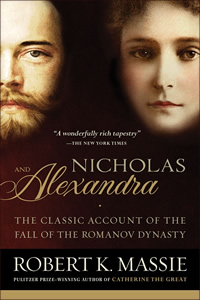 Massie: Yes. And whenever you see this person, he’s a visible walking talking reminder of that. It doesn’t make it admirable, but training your heir, and preparing him, or her, is fraught with all kinds of psychological uneasiness.
Massie: Yes. And whenever you see this person, he’s a visible walking talking reminder of that. It doesn’t make it admirable, but training your heir, and preparing him, or her, is fraught with all kinds of psychological uneasiness.
And while we’re on this topic, I suppose you could also fault Catherine for essentially taking away her grandson Alexander, snatching him away from his parents, because by that time she had very strong ideas about what a future emperor should be taught, and she didn’t think Paul and his wife were capable of giving Alexander the proper education and guidance that she wanted him to have.
Chapter 16: Catherine made a magnificent protagonist. Who, among the minor characters you encountered while writing, were your favorites?
Massie: I guess Potemkin, after Catherine. He wasn’t abusive. I’m a man, and I know men’s reactions to strong women, I’ve been married to two, and it’s a challenge for both parties. I love the solution they reached, which was to say, “We will continue to love each other from afar, but for our private physical needs we’ll look elsewhere; it’s not going to come between you and me.”
Chapter 16: How did you feel about Elizabeth? Did you dislike her?
Massie: No, I didn’t. I liked her independence. She was different from Catherine—she didn’t want the crown. She wanted to be free. And I liked her fraternizing with the peasantry, riding astride in the face of convention, I like the fact that she slept with anybody she felt like.
You know, in a way I miss all of them. When I was getting close to finishing the book, my feeling was that I really would love to have been included in one of those informal evenings where protocol was laid aside, and Catherine stayed up laughing with her devoted lifelong friends. She says again and again how laughter was what got her through the difficult times in her life, and says how she still loves to laugh. I would have liked the chance to laugh along with her, at the end of her remarkable life.
As part of the Salon@615 series, Robert K. Massie will discuss Catherine the Great on January 15 at the Nashville Public Library. The event will begin with a reception at 2:15 p.m., followed by the author talk at 3. Both are free and open to the public.
